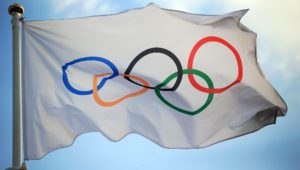Chris Liwski is blogging from the luxury of the spares seat in the US Sweep team. He writes on WSJ China Journal
Let the Games Begin…
Well, I think anyone who watched would agree that Friday night’s opening ceremonies were quite impressive. Yet while the technology displayed was without doubt state-of-the-art and great to watch, what ultimately still made the ceremonies for me was watching other athletes from around the world parade into the stadium. I guess there’s something about the pride visible in the faces of so many athletes as they march in behind their country’s flag, that makes the opening ceremonies what they are.
Our squad had a slightly different perspective of the ceremonies, however, due to the fact that the heats for rowing began 12 hours later. As a team therefore we all stayed at our hotel by the race course, a good hour outside of Beijing, and watched the festivities on a large projection screen while having dinner. It obviously was far from the real thing, but due to the formating of the events at the Games, this has become a bit of a tradition with which U.S. rowers have become accustomed. Receiving text messages from other athletes who were at the ceremonies did confirm one of our expectations, which was that it would be hot… very, very hot. I believe one text message said something to the effect of: “It’s so hot and humid in here that my blazer has completely soaked through and sweat is now dripping from the trim of my coat.”
However, Beijing’s heat and humidity is something we’ve definitely grown to expect. Sweating off anywhere from three to five pounds of water weight per practice has become part of the daily routine here, so it was really no surprise when Friday night’s temperature hovered somewhere in the 90s, with the soupy humidity only adding to the experience.
Conditions here at the course though, and overall, have definitely been tolerable. Sure it’s hot, but I guess these are the summer Games, right? As for the air quality, while I would agree that it’s definitely not ideal, it has also yet to slow us down. The thing about these adverse conditions are that they will affect all athletes across the board, so it basically becomes a question of who can adapt.
What still astonishes me however is the ubiquitous haze that constantly lingers above all of us here at the Games. I’ve really never seen (or rather had trouble seeing through) anything like it. I know the government has shut down regional factory production, and limited the amount of vehicles permitted on the roads, which probably would explain why I’ve found the haze to be more of a visual burden than an immediate physiological impediment at this point. That being said, I can only imagine what negative impacts long-term training in these conditions would have.
All the same though, in a strange way it’s probably for the best that the haze continues to linger. By that I mean, I don’t really think it does any good pretending things are better than they are. What kind of precedent does it set to just shut everything down, let the sky’s clear up (or not) for a few weeks and then just return to business as usual? What would have been gained?
By bringing the Olympics to Beijing the world has done well in forcing attention be called towards the environmental issues evident here, but it is the omnipresent haze that reminds me that things still need to get a lot better.
We’ll all be gone in a few weeks time, I just hope that the environmental change that has been spurred by these Olympics doesn’t stop with the closing ceremonies.






